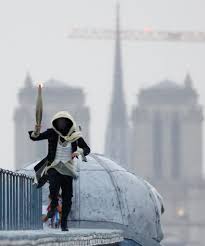Note: If you wish to receive, via e-mail, (1) my weekly newsletter or (2) daily copies of these posts, write to me at rrbates1951@gmail.com. Comments may also be sent to this address. I promise not to share your e-mail with anyone. To unsubscribe, write here as well.
Tuesday
While many viewers were bewildered by some of the opening ceremonies of the Paris Olympics, Washington Post sports writer Sally Jenkins has helped me make sense of them. There’s a literary connection.
Which makes sense given the high value that the French put on literature. I can speak to this from personal experience. I attended a Parisian school when I was 13—my French professor father had a sabbatical—and we spent one hour out of the six memorizing French poetry.
Our school day went from 9-12 and 2-5, with two hours for lunch, and memorization occurred from 11:30-12 and 4:30-5. To this day I can recite poems by Paul Verlaine, Guillaume Apollinaire, and Jean de la Fontaine. Incidentally, to get to and from school involved walking underneath the Eiffel Tower four times a day, so NBC’s shots of the structure have unleashed waves of emotion.
Back to Jenkins, who is the grittiest and least-likely-to-bullshit sports writer that I know. As she sees it, the masked torchbearer was meant to ask the question, “Will the Olympic peace hold?” After all, in a city that has experienced a horrendous act of mass terrorism, the Paris Olympics represent a security nightmare. “Can you hold an urban Olympics,” Jenkins wonders, “amid multiple wars, in a city teeming with contingents from all sides, including some of the largest Jewish and Muslim communities in Europe, at a time when threats have multiplied and perhaps are no longer containable.”
With beach volleyball at the base of the Eiffel Tower, equestrian events at Versailles, and skateboarding at the Place de la Concorde, Jenkins points out that the security complexities are incomprehensible. No amount of surveillance is going to protect spectators and athletes if terrorists take it in their mind to strike.
It is because of the possibilities for mayhem, Jenkins believes, that the organizers were not willing to deliver up “the usual sugary pageantry.” No “candied and cloying” presentation for them. No “pixies prattling songs about peace in Paris.” No “hackneyed sequences of stuffed-animal mascots dancing with children, and the ever-obligatory chrysalis and butterflies.” Here’s what we got instead:
The Conciergerie, prison to Marie Antoinette, spouted ribbons of blood and red smoke from its windows, while a metal band clanged like iron doors slamming. The subjects of great paintings burst out of the frames to peer like inmates from windows of museums. An armored horsewoman, one part Joan of Arc and one part robot, clattered down the Seine as if charging to battle, bearing — the flag of peace?
And now for the literary influences. The unknown torchbearer, Jenkins says,
was meant to be an amalgam of French characters and totems: the Man in the Iron Mask from Dumas, the Phantom of the Opera, Ezio from Assassin’s Creed, the wolfishly named thief and master of disguise Arsène Lupin, and Belphegor, or as Victor Hugo described him, Hell’s Ambassador. All of them fugitives from autocratic imprisonment or isolation in deep chambers, ostracized as monsters in belfries and underground cisterns.
Let’s unpack this. Except for Belphegor, who apparently is a demon, all the figures have associations with France’s revolutionary spirit—which is to say, they represent a (sometimes problematic) alternative to the established order.
Alexander Dumas’s The Man in the Iron Mask is the final book in the Three Musketeers series, all of which I read avidly as a boy. The prisoner is Louis XIV’s secret twin brothers, whom the parents have rendered anonymous for fear of the political problems that might arrive later for Louis. And indeed, Athos, Porthos, and Aramis are seeking to rescue him and put him on the throne, which sets them in conflict with the establishment D’Artagnan, now head of the musketeers.
One could say that Phantom of the Opera, originally a 1910 novel by Gaston Leroux but better known from the 1925 Lon Chaney film and the 1986 Andrew Lloyd Webber 1986 musical, has its own revolutionary theme: management does not appreciate the phantom’s musical preferences. And then there’s Arsène Lupin, the Maurice Leblanc creation that many Americans first learned about through the French Netflix series. The gentleman thief, who uses his Sherlock Holmes-level brain to rob from the rich and redistribute among the deserving, has long been a fixture in French cinema.
Ezio is apparently a video game figure from Assassin’s Creed (I had to look this up), a member of a 15th century secret order dedicated to safeguarding peace and freedom. Jenkins also mentions Jean Valjean from Les Misérables, who scales walls, plunges into tunnels, and rescues revolutionaries (one anyway) while being hounded by police inspector Javert. The columnist observes,
France’s literature, music and philosophy are drenched in this stuff — idealists crushed at the barricades, bayed to death by Javert fanatics or head-seeking throngs, driven to dungeons from which they seek to break out into open air. This culture does not lend itself to cloying clichés. There is no escaping the buried truth of it — especially during this Olympics, an exercise taking place right on the cobblestones.
By means of its opening ceremony, Jenkins says, France was telling us,
We’ve had our heads and our hearts broken for thousands of years, but we’ve found our way to civilized culture, because we choose not to hide or dispute our dank past, but to marry it to modernity. We have blood in the deep ancient cracks of our streets and the hidden dungeons where people were manacled in the cistern-seeping dark. Yet despite all those violent epochal fractures, here is our country, at peace enough to host you.
Not exactly a warm and fuzzy welcome. But very French.


